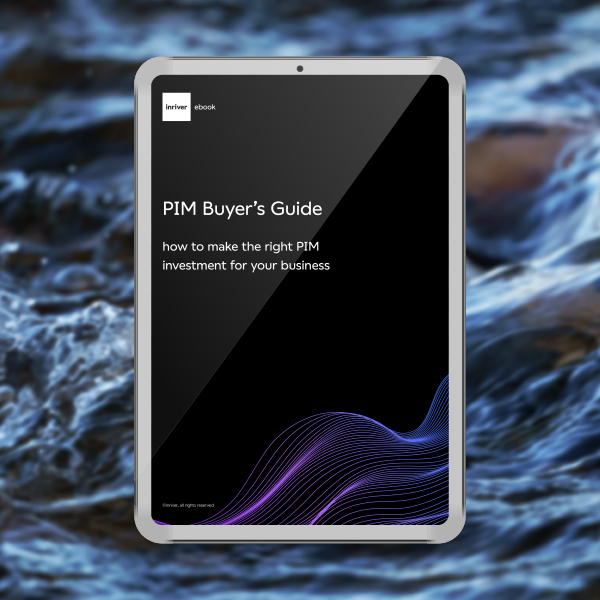11 must-have PIM features
take your business onwards and upwards
See the PIM capabilities your organization can’t do without with the inriver guide to the features your new PIM system should have.
Today, Product Information Management (PIM) systems do much more than simply store data. Or at least, they should.
As digital commerce strategies have evolved, so have PIM solutions. Beyond simple data repositories, PIM acts as a single source of truth to unite an enterprise’s product information at every level. By following PIM best practices, businesses can leverage the full potential of these systems. Some of the best PIM solutions take it further—offering the full suite of tools needed to onboard, enrich, and distribute accurate product information in the modern omnichannel market.
For brands, manufacturers, and retailers seeking to up their product information management game, read on for all the essential features your PIM needs in 2024.
1. Simplified data onboarding
The ideal PIM system not only provides a centralized data set for everyone to draw on—but it also keeps that data set updated with the latest accurate product information. Onboarding features enable your PIM software to seamlessly plug into existing data feeds and do just that.
Whether consolidating internal SKU data or streamlining data inflows from 200+ suppliers, a PIM system with stellar onboarding ensures your product information starts its journey off on the right foot.
2. A dynamically adaptable data model
As your business grows and adapts to market changes, you’ll want a PIM solution that can grow with you. Only the highest-class PIM solutions feature fully extensible data models—a scalable framework that allows for unlimited configuration while maintaining a user-friendly interface.
With customizable attributes, entity structuring, and the ability to assign product-variant relationships, flexible data models allow you to list single products with multiple variations and ensure that updates to the original product can automatically be rolled out across the board or segmented as necessary.
This must-have feature equips brands, manufacturers, and retailers with the agility to adapt entire product lines to new changes in minutes instead of months, all while maintaining data quality.

3. Secure data governance
With more sensitive data online than ever, security remains a top-of-mind concern. Data governance aims to provide a secure framework when accessing sensitive product information, ensuring accountability and integrity across your organization.
Modern PIM solutions feature built-in product data governance principles to ensure the highest-quality security, as well as compliance with increasingly stringent industry regulations.
4. Collaborative workflow management
A standard PIM system ensures all departments work from the most updated and relevant data. An advanced PIM takes this a step further with a closed-loop data management platform, uniting departments such as:
- E-commerce: Streamline scaling into new regions and markets
- Marketing: Optimize strategy through digital shelf insights
- IT: Unify internal processes through API-driven integrations
With a single source of data truth and a suite of collaboration tools, such a PIM optimizes workflows and streamlines internal operations.
5. Multimedia management
No matter what kind of product or service you offer, rich media and engaging visual content are what entice and inspire customers. Advanced PIM solutions offer multimedia management features so you can easily create, manage, and distribute enriched product content such as:
- Images
- Videos
- Descriptions
- Manuals
The emergence of augmented reality and 3D visualization technologies also invites PIM support, transforming product data into a truly visual buying experience that captivates and converts potential customers.
Some PIM further integrates with your existing Digital Asset Management (DAM) systems, enabling you to utilize existing media in an omnichannel strategy with just a few clicks.

6. AI-powered content enrichment
AI is central to modern PIM solutions. As product data begins to flow from internal audiences to external ones, AI optimization features can help automate the enrichment processes, enabling you to craft accurate, compelling content like:
- Product catalog listings
- SEO-optimized product descriptions
- Sales playbooks
A well-structured PIM catalog ensures that AI-driven enrichment processes have a solid foundation, enhancing the quality and consistency of the output. This enables you to streamline creative workflows while ensuring content remains relevant and tailored to your products. By adopting PIM implementation best practices, you can maximize the efficiency of these AI-driven processes.
7. Content localization
A critical challenge for growing enterprises is localizing content for new global markets. A sophisticated PIM system simplifies this challenge with AI-powered automated translation services. Ideally, these advanced features go beyond mere translation—they enable content to be tailored for specific customer segments, catering to diverse cultural nuances and preferences. PIM integration is key to ensuring seamless localization efforts across various regions.
8. Sustainability and Compliance
In line with global sustainability standards, businesses need to take extra care to remain compliant at key points, such as:
- Ethical sourcing and supply chain transparency
- Delivery logistics, such as transport emissions
- Product aftersale and end-of-life processes
A comprehensive product information management solution is purpose-built for gathering data (including sustainability data) at every point of the product journey, positioning you at the forefront of compliance in the eyes of regulators and customers alike. Data integration within your PIM system is essential for maintaining data accuracy and ensuring compliance with sustainability standards.

9. Product data syndication
With omnichannel marketing emerging as an essential strategy to capture fleeting customer attention, your PIM needs a way to effortlessly distribute accurate, consistent product information to any channel, anytime.
Product Data Syndication (PDS) is a feature that does exactly that—instantly distributing reliable and relevant product information in a way that’s contextualized and tailored to each channel. Top-tier PDS utilizes bi-directional API connectivity, boosting time-to-market by instantly and flexibly connecting product data to hundreds of major marketplaces, retailers, and resellers.
Not only does PDS free up valuable resources, but it also works with your PIM system to eliminate risks associated with manual input, such as pricing errors and incorrect product descriptions. Following best practices for PIM implementation can ensure your product data is always accurate and efficiently syndicated.
10. Digital shelf analytics (DSA)
Your digital shelf is your brand’s online presence—virtual touchpoints such as:
- Social media platforms
- Online marketplaces
- E-commerce channels
- Search engine results pages (SERPs)
From brand-owned websites to sprawling digital markets like Amazon, the right PIM offers robust digital shelf analytics that paves the way for optimized online product visibility and performance.
By linking DSA with a PIM’s single source of data truth, brands keep their digital shelves centralized, in sync, and spotless from outdated or incorrect info, ensuring customers stay loyal and engaged. Implementing a PIM system with key features like DSA can significantly enhance your digital shelf management.
11. Closed-loop functionality
The best PIM systems offer more than fragmented, tacked-on services—they combine all the previous features into a singular platform. This sky-eye view of your entire product journey includes monitoring listings in real-time, feeding you data-driven insights to inform innovative marketing strategies and optimizations.
A PIM that offers a truly closed-loop platform not only delivers these insights but also enables you to act upon them in the same platform, maximizing your agility and sharpening your competitive edge. Ensuring data accuracy through continuous monitoring and updates is a hallmark of an effective closed-loop PIM platform.
inriver: One complete solution for all the must-have PIM features
PIM software has come far since its conception. With these 11 features and more, the inriver PIM system offers a strategic advantage, enabling businesses to drive efficiency, growth, and customer satisfaction in the evolving digital commerce landscape.
For brands seeking a PIM built for modern business, consider the inriver solution. Reach out to our experts today to see how you could benefit from our PIM’s many features.
want to see the inriver PIM in action?
Schedule a personalized, guided demo with an inriver expert today to see how the inriver PIM can get more value from your product information.
